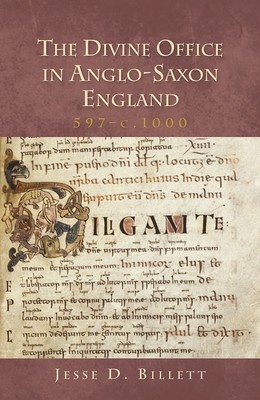
- We will send in 10–14 business days.
- Author: Jesse D Billett
- Publisher: Henry Bradshaw Society
- ISBN-10: 1907497285
- ISBN-13: 9781907497285
- Format: 14.5 x 21.6 x 3.8 cm, kieti viršeliai
- Language: English
- SAVE -10% with code: EXTRA
The Divine Office in Anglo-Saxon England, 597-C.1000 (e-book) (used book) | bookbook.eu
Reviews
Description
First full-scale survey and examination of liturgical practice and its fundamental changes over four centuries.
At the heart of life in any medieval Christian religious community was the communal recitation of the daily "hours of prayer" or Divine Office. This book draws on narrative, conciliar, and manuscript sources to reconstruct the history of how the Divine Office was sung in Anglo-Saxon minster churches from the coming of the first Roman missionaries in 597 to the height of the "monastic revival" in the tenth century.Going beyond both the hagiographic "Benedictine" assumptions of older scholarship and the cautious agnosticism of more recent historians of Anglo-Saxon Christianity, the author demonstrates that the early Anglo-Saxon Church followed a non-Benedictine "Roman" monasticliturgical tradition. Despite Viking depredations and native laxity, this tradition survived, enriched through contact with varied Continental liturgies, into the tenth century. Only then did a few advanced monastic reformers conclude, based on their study of ninth-century Frankish reforms fully explained for the first time in this book, that English monks and nuns ought to follow the liturgical prescriptions of the Rule of St Benedict to the letter. Fragmentary manuscript survivals reveal how monastic leaders such as Dunstan and Ãthelwold variously adapted the native English liturgical tradition - or replaced it - to implement this forgotten central plank of the "Benedictine Reform". Jesse D. Billett is Assistant Professor in the Faculty of Divinity, Trinity College, Toronto.
EXTRA 10 % discount with code: EXTRA
The promotion ends in 23d.12:39:46
The discount code is valid when purchasing from 10 €. Discounts do not stack.
- Author: Jesse D Billett
- Publisher: Henry Bradshaw Society
- ISBN-10: 1907497285
- ISBN-13: 9781907497285
- Format: 14.5 x 21.6 x 3.8 cm, kieti viršeliai
- Language: English English
First full-scale survey and examination of liturgical practice and its fundamental changes over four centuries.
At the heart of life in any medieval Christian religious community was the communal recitation of the daily "hours of prayer" or Divine Office. This book draws on narrative, conciliar, and manuscript sources to reconstruct the history of how the Divine Office was sung in Anglo-Saxon minster churches from the coming of the first Roman missionaries in 597 to the height of the "monastic revival" in the tenth century.Going beyond both the hagiographic "Benedictine" assumptions of older scholarship and the cautious agnosticism of more recent historians of Anglo-Saxon Christianity, the author demonstrates that the early Anglo-Saxon Church followed a non-Benedictine "Roman" monasticliturgical tradition. Despite Viking depredations and native laxity, this tradition survived, enriched through contact with varied Continental liturgies, into the tenth century. Only then did a few advanced monastic reformers conclude, based on their study of ninth-century Frankish reforms fully explained for the first time in this book, that English monks and nuns ought to follow the liturgical prescriptions of the Rule of St Benedict to the letter. Fragmentary manuscript survivals reveal how monastic leaders such as Dunstan and Ãthelwold variously adapted the native English liturgical tradition - or replaced it - to implement this forgotten central plank of the "Benedictine Reform". Jesse D. Billett is Assistant Professor in the Faculty of Divinity, Trinity College, Toronto.


Reviews